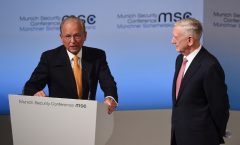
MUNICH, Germany (AFP) — Jittery European partners looking for reassurance from a member of US President Donald Trump’s new administration might have found it Friday in the form of Defense Secretary James Mattis.
Allies are deeply troubled after Trump’s campaign rhetoric questioned long-established alliances, and they worry about a simmering scandal over possible ties between the White House and Moscow.
Mattis, a former four-star Marine general whom Trump coaxed from retirement to run the Pentagon, has repeatedly taken views diverging broadly from those of his boss.
While campaigning, Trump called NATO “obsolete” and spoke disdainfully of the mutual defence alliance, suggesting America is getting ripped off by member nations not paying their way.
Since his inauguration, he has taken a more traditional tack on the key issues.
The financing of the 28-country group is a longstanding gripe, but what has rattled NATO and Western partners the most is the possible connections between Trump and the Kremlin.
Trump has praised President Vladimir Putin on several occasions, suggested Russia and the United States are morally equivalent and has pushed for closer military cooperation between the two powers.
Mattis, who on Thursday said the Pentagon is not yet ready for new military ties to Russia, told world leaders at the Munich Security Conference that the United States remains committed to the current international security system.
“The transatlantic bond remains our strongest bulwark against instability and violence,” Mattis said.
“I am confident that we will strengthen our partnerships, confronting those who choose to attack innocent people or our democratic processes and freedoms.”
-Mattis has helped shape Trump’s views on other issues too, including his boss’s professed admiration for waterboarding and torture. Mattis opposes such techniques and has pushed back on the issue.
In an interview with the New York Times, Trump recounted how Mattis had said that winning a prisoner’s trust is a far more effective way of obtaining information.
“‘Give me a pack of cigarettes and a couple of beers and I’ll do better,'” Trump said Mattis had told him.
The former Marine is well known for his anecdotes and pithy sayings.
On the eve of the Iraq invasion, he told Marines to: “Engage your brain before you engage your weapon.”
He also famously — and controversially — said in regard to fighting the Taliban that it’s “a hell of a lot of fun to shoot them.”
Mattis is one of several heavy hitters from the Trump adminstration in Europe this week.
Secretary of State Rex Tillerson visited the G20 summit in Bonn, where he said Washington would conditionally consider working with Moscow in some areas, but he called on Russia to honour the Minsk peace agreement aimed at ending hostilities in Ukraine.
Vice President Mike Pence is due to address the Munich conference Saturday and Homeland Security Secretary John Kelly is also attending.
– ‘Massive uncertainty’ –
Ahead of Pence’s visit, German Defence Minister Ursula von der Leyen urged the United States not to take transatlantic ties for granted.
“Our American friends know well that your tone on Europe and NATO has a direct impact on the cohesion of our continent,” she said.
Conference chairman Wolfgang Ischinger, Germany’s former ambassador to Britain, said the global political situation was unprecedented in modern times and described a “massive uncertainty” gripping Europe.
“European leaders and European governments are extremely impatient to find out what will really drive US foreign policy in this new period,” he said, underscoring that many in Europe are clamouring to find out about the future of US-Russian relations.
The Baltic states are especially nervous, given their history under the Soviet Union and proximity to Russia.
“Russia is in our view the threat,” Lithuanian Defence Minister Raimundas Karoblis told reporters at NATO headquarters.
“After the annexation of Crimea and (Russia’s) continuous aggression in the east of Ukraine. (Their) increased capabilities near our borders — it’s really created the risk” of conflict, he added.
The White House is still reeling from the forced resignation Monday of Trump’s national security advisor Michael Flynn, after it was revealed that he held pre-inauguration phone calls with the Russian ambassador about US sanctions policy.
Trump on Thursday denied he or his staff had any pre-election contacts with Moscow.
“I have nothing to do with Russia,” Trump said. “The whole Russia thing is a ruse.”
wat/pvh
© Agence France-Presse








